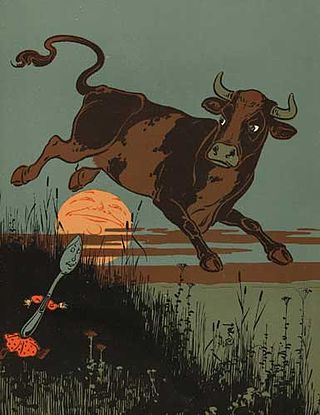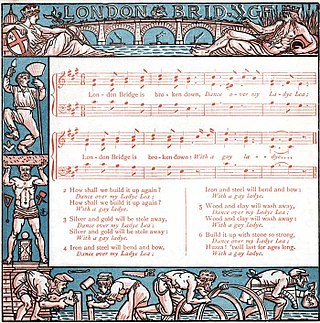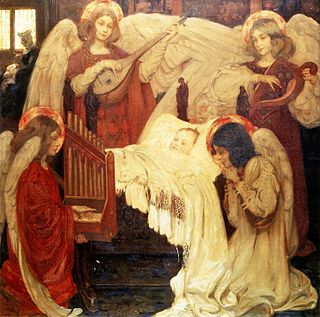Doctor Foster may refer to:
- "Doctor Foster" (nursery rhyme), an English nursery rhyme
- Doctor Foster (TV series), a British television drama
- Dr Foster Intelligence, a healthcare information company
Doctor Foster may refer to:

A nursery rhyme is a traditional poem or song for children in Britain and many other countries, but usage of the term dates only from the late 18th/early 19th century. The term Mother Goose rhymes is interchangeable with nursery rhymes.
"Twinkle, Twinkle, Little Star" is an English lullaby. The lyrics are from an early-19th-century English poem written by Jane Taylor, "The Star". The poem, which is in couplet form, was first published in 1806 in Rhymes for the Nursery, a collection of poems by Taylor and her sister Ann. It is now sung to the tune of the French melody "Ah! vous dirai-je, maman", which was first published in 1761 and later arranged by several composers, including Mozart with Twelve Variations on "Ah vous dirai-je, Maman". The English lyrics have five stanzas, although only the first is widely known. The song is in the public domain.

Humpty Dumpty is a character in an English nursery rhyme, probably originally a riddle and one of the best known in the English-speaking world. He is typically portrayed as an anthropomorphic egg, though he is not explicitly described as such. The first recorded versions of the rhyme date from late eighteenth-century England and the tune from 1870 in James William Elliott's National Nursery Rhymes and Nursery Songs. Its origins are obscure, and several theories have been advanced to suggest original meanings.

"Hey Diddle Diddle" is an English nursery rhyme. It has a Roud Folk Song Index number of 19478.

"Oranges and Lemons" is a traditional English nursery rhyme, folksong, and singing game which refers to the bells of several churches, all within or close to the City of London. It is listed in the Roud Folk Song Index as No 13190. The earliest known printed version appeared c. 1744.

Tweedledum and Tweedledee are characters in an English nursery rhyme and in Lewis Carroll's 1871 book Through the Looking-Glass, and What Alice Found There. Their names may have originally come from an epigram written by poet John Byrom. The nursery rhyme has a Roud Folk Song Index number of 19800. The names have since become synonymous in western popular culture slang for any two people whose appearances and actions are identical.

"London Bridge Is Falling Down" is a traditional English nursery rhyme and singing game, which is found in different versions all over the world. It deals with the dilapidation of London Bridge and attempts, realistic or fanciful, to repair it. It may date back to bridge-related rhymes and games of the Late Middle Ages, but the earliest records of the rhyme in English are from the 17th century. The lyrics were first printed in close to their modern form in the mid-18th century and became popular, particularly in Britain and the United States, during the 19th century.

"Little Miss Muffet" is an English nursery rhyme of uncertain origin, first recorded in 1805. It has a Roud Folk Song Index number of 20605. The rhyme has for over a century attracted discussion as to the proper meaning of the word tuffet.

"Jack Sprat" is an English language nursery rhyme. It has a Roud Folk Song Index number of 19479.

"Baa, Baa, Black Sheep" is an English nursery rhyme, the earliest printed version of which dates from around 1744. The words have not changed very much in two and a half centuries. It is sung to a variant of the 18th century French melody Ah! vous dirai-je, maman.
Nursery may refer to:
Jack Horner may refer to:

"Sing a Song of Sixpence" is an English nursery rhyme, perhaps originating in the 18th century. It is listed in the Roud Folk Song Index as number 13191. The sixpence in the rhyme is a British coin that was first minted in 1551.
Solomon Grundy may refer to:

"Doctor Foster" is an English language nursery rhyme that has appeared in many anthologies since the nineteenth century. It has a Roud Folk Song Index number of 19288.

"Matthew, Mark, Luke and John", also known as the "Black Paternoster", is an English children's bedtime prayer and nursery rhyme. It has a Roud Folk Song Index number of 1704. It may have origins in ancient Babylonian prayers and was being used in a Christian version in late Medieval Germany. The earliest extant version in English can be traced to the mid-sixteenth century. It was mentioned by English Protestant writers as a "popish" or magical charm. It is related to other prayers, including a "Green" and "White Paternoster", which can be traced to late Medieval England and with which it is often confused. It has been the inspiration for a number of literary works by figures including Henry Wadsworth Longfellow and musical works by figures such as Gustav Holst. It has been the subject of alternative versions and satires.
I do not likethee, Doctor Fell is an epigram, said to have been translated by satirical English poet Tom Brown in 1680. Later it has been recorded as a nursery rhyme and a proverb.
Jack Sprat is a nursery rhyme